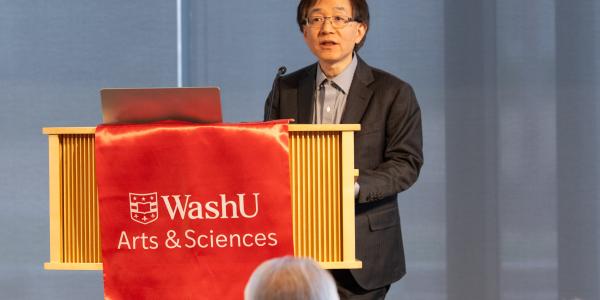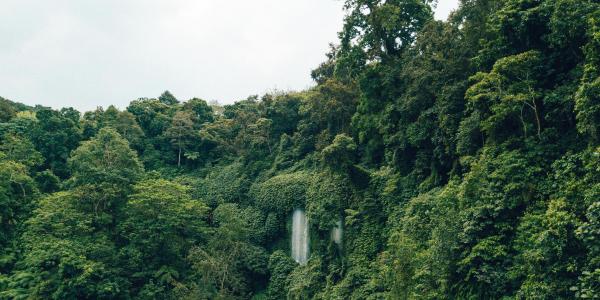Whether she’s working with cassava farmers in Ghana or potato farmers in St. Louis, Tori Harwell isn’t afraid to get her hands dirty. A rising senior majoring in African and African American studies and environmental analysis, Harwell has found success by seeking out fresh perspectives. They’ve been named an Ervin Scholar, a Mellon Mays Fellow, a Gephardt Institute Goldman Fellow, and an Udall Scholar, an honor bestowed on students who have demonstrated leadership in areas including the environment and conservation.

Where did your interest in agriculture come from?
My father grew up on a small, 250-acre farm in Minnesota. As a kid, he helped sell vegetables at roadside stands. He taught me to appreciate the land and everything that grew on it. I spent my first 18 years in Centennial, Colorado, a suburb of Denver. We didn’t live on a farm, but I could name every plant within a mile of the house.
How did you end up at WashU?
My mother graduated from WashU in 1993 with a degree in English literature. She was a true leader on campus and in the community. Among other honors, she won the Chancellor’s Award for Academic Excellence. She died in 2018 while I was in high school, and I try to honor her memory.
When I was first thinking about colleges, I didn’t really expect to end up at WashU. But my mom’s best friend — I call her my aunt — encouraged me to apply to the John B. Ervin Scholars Program. That scholarship changed my life, and it’s the reason I’m here.
What are your main research interests?
For my thesis, I’m applying queer and Black frameworks to farming in Ghana, looking at the revolutionary and subversive act of growing things. I’m fascinated with the ways that people in general — and marginalized people in particular —produce food and interact with the land. When I visited Ghana over winter break, I stayed with relatives of my aunt — the same person who encouraged me to attend WashU.
As part of my Gephardt Institute Goldman Fellowship, I connected Black farmers in St. Louis with the Great Rivers Environmental Law Center, a public interest firm that provides free legal services to people and groups working to protect the environment and promote public health. My main goal was to help farmers get resources to be as productive and successful as possible, all while supporting the land. I was willing to do whatever I could. I vividly remember helping a farmer plant potatoes in 95-degree heat. Sometimes you have to get your hands dirty.
I spent the spring semester of my junior year studying abroad at the University of Cape Town in South Africa. I took courses in environmental analysis and African feminism, continuing my interest the interplay between land and culture.
What are your ultimate career goals?
I want to help communities — especially Black and indigenous communities — develop ways to mitigate climate change. We need to honestly think about everything: Where our food comes from, where our energy comes from, the things that we have in our power. I like to ask people: If you could change your neighborhood now, would you change it? How would you make it more efficient and effective? And how would you use that community to build something new?
What do you do for fun?
Growing up in Colorado, I developed a love for hiking. I can’t exactly climb mountains around here, but I do enjoy time on trails, whether it’s in Forest Park or one of the many hiking trails outside of the city.
I really embrace the arts community on campus. I’ve been active in the WU-SLam poetry group, and I support my friends when they have an art showcase or perform in their a cappella choir.
I spend a lot of time with other Ervin and Mellon Mays fellows. Some of that is by design — we have a lot of dinners and group activities — but much of it is by choice. They’re my own community within a community. Those fellowships and people have really cemented me as a person and a member of WashU.




